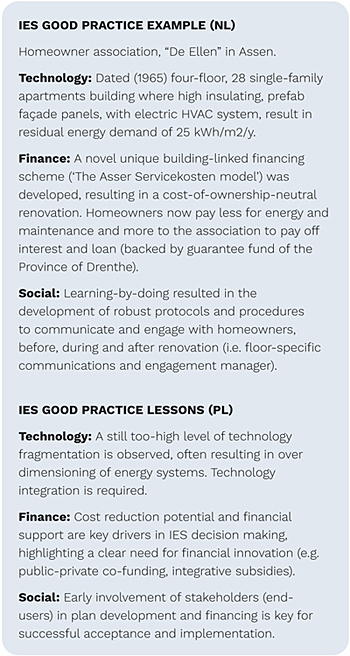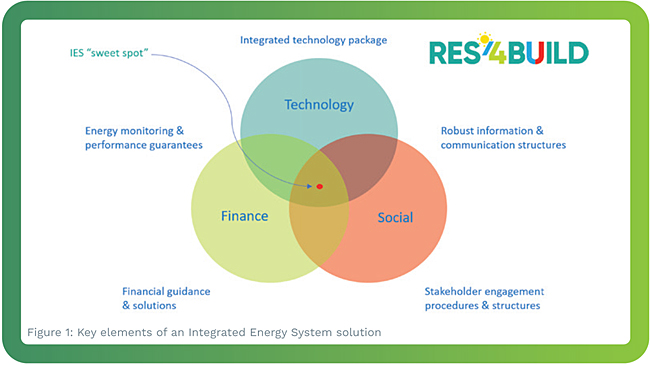By Eise Spijker, Wytze van der Gaast, Ida Terluin (JIN Climate & Sustainability), Ludmiła Wach, Katarzyna Grecka, Andrzej Szajner (Baltic Energy Conservation Agency)
 A NECESSITY FOR THE EU RENOVATION WAVE?
A NECESSITY FOR THE EU RENOVATION WAVE?
The European Commission launched the European Green
Deal in 20191 to address the climate challenge, with an
integrated policy package covering a range of sectors.
For the built environment, the Renovation Wave2 aims to
accelerate improvement of the energy performance of 35
million buildings by 2030.
To achieve this, much emphasis is put on advancing
technology integration by developing integrated and
compatible technology packages for building renovations.
However, a technology perspective alone is not enough. A
good practice assessment3 performed by the EU funded
RES4BUILD project on Integrated Energy Solutions (IES)
reveals that accelerating the uptake of IES increasingly
requires consideration of financial and social innovation
to address non-technological barriers.
It was found that a robust IES solution needs solid
technologies which become affordable thanks to
accompanying financing and warranty plans (e.g.
building-linked finance, lease/rent/subscription-based
finance, energy performance contracting), and socially
realistic with help of end-user engagement procedures
and communication protocols before, during and after
the renovation.
Barriers to implement and scale IES
D'oca, et al. (2018)4 conclude that, "Until now, deep
renovation has often been approached as a technological
challenge" while "social and financial barriers have
been overlooked". They suggest that "new approaches
will probably need to integrate technical, financial, and
social aspects from the beginning […]." Both literature
and market experience offer insights on technical,
financial, and social barriers to the upscaling of individual
technologies (e.g. heat pump, solar PVT) and IES
concepts in the built environment, as well as ways to
overcome these barriers.
Integrated Energy Solutions 2.0
An IES solution should thus be more than a turn-key
technology package composed of a mixture of energy
installation, insulation, and IT controller technologies.
The RES4BUILD assessment highlights good practices in
Poland and the Netherlands, and explores key elements of
a robust, marketable, and scalable IES (Fig. 1).
Based on this assessment, a robust IES should:
- Be an integrated turn-key technology package that offers a guaranteed energy performance (performance contract); where a smart ICT system monitors i) the energy system and ii) end-user behavior, and where there are clear and simple lines for communication and engagement with stakeholders / end-users available before, during and after renovation.
- Provide innovative fi nance solutions to be developed and offered jointly with an IES technology concept to allow for multi-stakeholder, collective or group finance that is sufficiently flexible to meet specific end-user needs and limitations (e.g. building-linked finance, rent/lease/subscription finance packages, hybrid finance).
- Ensure early involvement of end-users in the IES implementation process to improve acceptance and faster implementation of IES by establishing collaborations with new social structures, like local citizen initiatives, homeowner associations, and energy cooperatives.

The full report is available for download on the
RES4BUILD project website (www.res4build.eu/results).
As work progresses within the project, more results
will be made available online – to stay up to date on
the latest news follow RES4BUILD on social media
(www.twitter.com/res4build). For more information on the
report please contact Eise Spijker at eise@jin.ngo
The RES4BUILD project has received funding from the European Union's Horizon 2020 research and innovation programme under Grant Agreement no. 814865. This output refl ects only the author's view. The Innovation and Networks Executive Agency and the European Commission cannot be held responsible for any use that may be made of the information contained therein.
1. European Commission. (2019). The European Green Deal. Brussels: European Commission.
2. European Commission. (2020). A Renovation Wave for Europe - greening our buildings, creating jobs, improving lives. Brussels: European Commission.
3. Spijker, E., Gaast, W.P. van der, Terluin, I., Grecka, K., Wach, L. and Szajner, A. (2020). Good Practice of Integrated Energy Systems; On Integrated Energy Systems in the built environment in Poland and The Netherlands. RES4BUILD (European Union's Horizon 2020 research and innovation programme under
grant agreement No 814865), Deliverable 4.1.
4. D'oca, S., Ferrante, A., Ferrer, C., Pernetti, R., Gralka, A., Sebastian, R., & op 't Veld, P. (2018). Technical, Financial and Social Barriers and Challenges in Deep Building Renovation: Integration of Lessons Learned from the H2020 Cluster Projects. Buildings 2018, 8, 174.